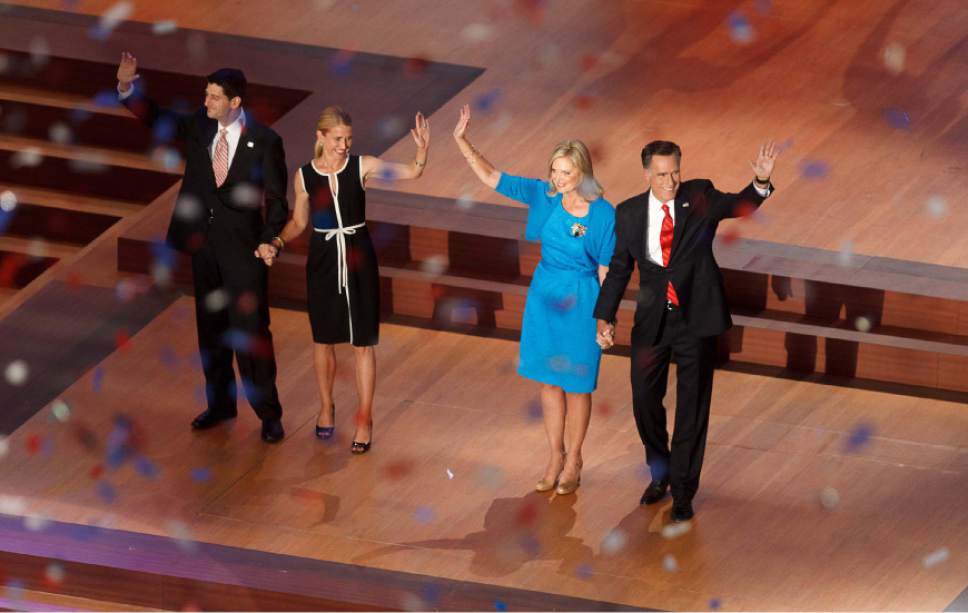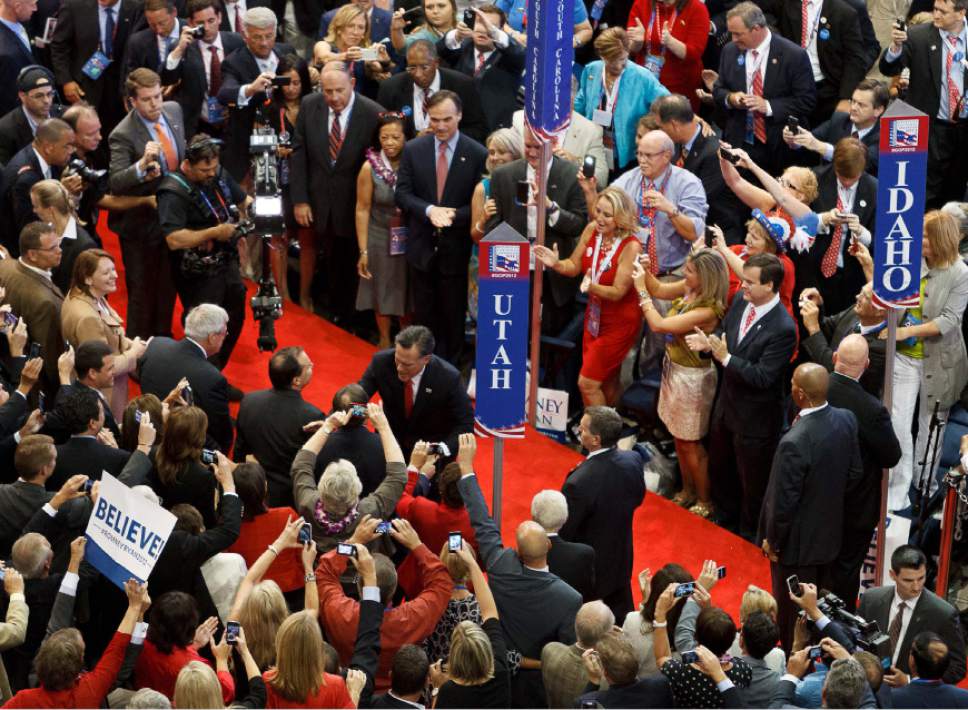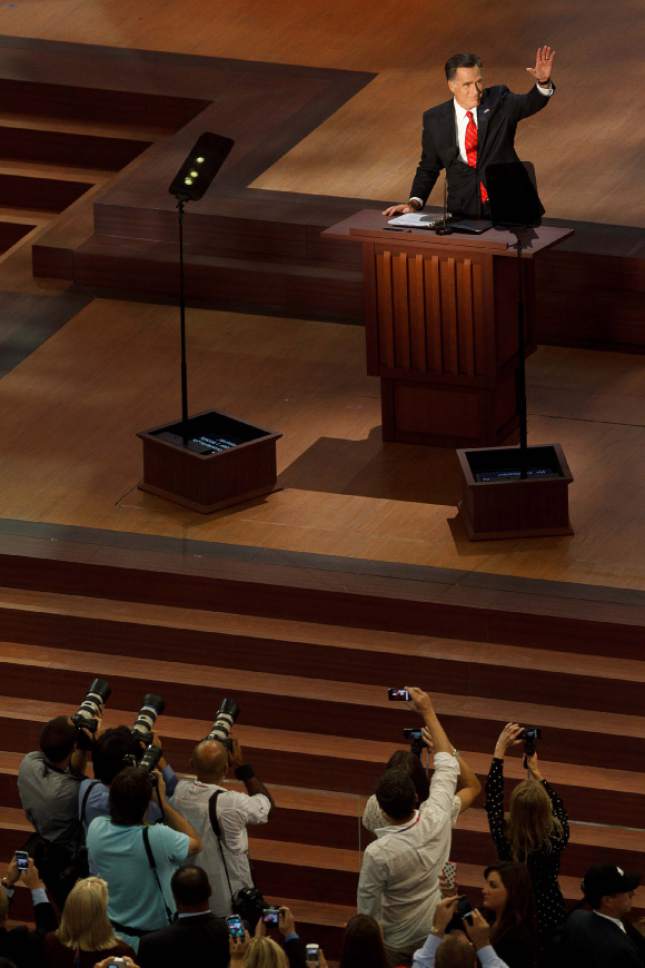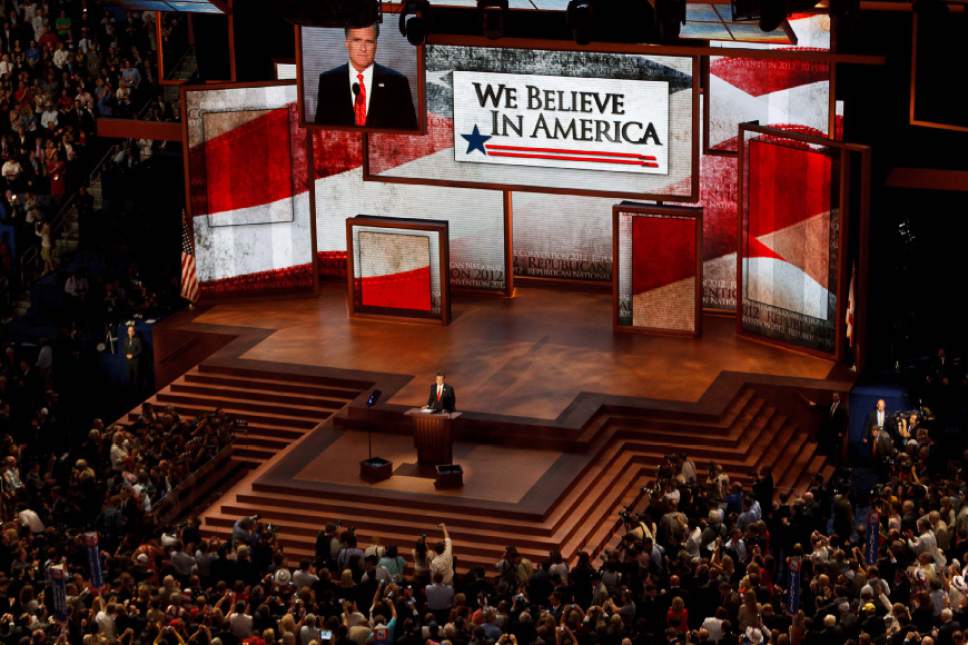This is an archived article that was published on sltrib.com in 2015, and information in the article may be outdated. It is provided only for personal research purposes and may not be reprinted.
Editor's note: This excerpt is from "Mormon Rivals," a new book by Salt Lake Tribune reporters Matt Canham and Thomas Burr. For more information go to http://www.MormonRivals.com.
Jon Huntsman wasn't about to announce his presidential bid from China. Or from Utah. And starting your White House run in Washington, a town America loves to hate, wasn't a good idea. So Huntsman went to New Jersey.
He had no ties to the Garden State, but he had worked as a young staffer for President Ronald Reagan, who announced his 1980 general election launch from Liberty State Park with the Manhattan skyline and Statue of Liberty as a backdrop. The famous photo from that campaign event is Reagan, in a crisp white shirt, sleeves rolled up, pointing at the flame that sits atop America's most famous statue.
Huntsman wanted the same.
He didn't get it.
Reporters who showed up early were handed press badges proclaiming them part of the "John Huntsman for President Announcement Tour." When the misspelling of the candidate's first name was pointed out, staffers snatched them back, but not before an ABC News reporter tweeted out the image.
The crowd was slim — easily outnumbered by journalists. It was overcast — not the sunny, blue-sky backdrop chief strategist John Weaver had envisioned — but it wasn't raining. A staffer gave the expected two-minute heads-up to the TV camera crews when someone in the back yelled out. "Wait! We have no power!"
Fred Davis, Huntsman's ad guy, had warned organizers they needed two generators, one for the show and one to be ready. Due to cost concerns, only one generator was ordered, and it had died.
With only seconds to spare, the generator sputtered to life just as Huntsman started his long walk across the grassy park to the stage, holding hands with wife Mary Kaye and daughter Gracie and flanked by the rest of his kids.
"Today, I'm a candidate for the office of president of the United States of America," Huntsman declared on stage.
Not many Americans saw it. Five minutes in, CNN cut away to a commercial break, MSNBC already was seeking feedback from pundits and Fox News was on to commercials.
Not that the networks had the best view anyway. The media platform was too high, leaving most cameras pointed down at Huntsman so that his background was not the famed symbol of America but a Circle Line tour boat docked on Liberty Island.
Still, Huntsman was in, officially, and ready to jaunt to New Hampshire for another introduction to the Granite State, this time with a large contingent of media in tow. Reporters were rushed to the bus to head to Newark's airport, where, upon arrival, a Port Authority squad car escorted the entourage to a plane with Arabic writing on the side.
After some confusion, the reporters were shuttled to another plane that would be headed to Portsmouth, N.H., and not Saudi Arabia. At a packed Exeter Town Hall later, Huntsman gave a speech similar to the first one before jetting back to Jersey. It wasn't the kickoff he wanted.
"I was furious," Huntsman later recalled.
Campaign aides knew it was bad. Really bad. If they couldn't pull off a scripted, made-for-TV moment like the announcement, how could they run a campaign that needed to pivot in the rough-and-tumble race? But there wasn't much that could be done immediately. The pop-up team was already locked in place, and there was no time to start fresh.
"If the Titanic is sinking, you don't talk about the paint on the cabin doors," said a former Huntsman senior aide.
Huntsman's entrance was met with sneers from Mitt Romney's advisers. To them, they had a little-known competitor who had just left the Obama administration as U.S. ambassador to China and thought he could topple the heir apparent.
"It was an annoyance," said a top Romney aide, "like a gnat."
—
Why he ran • Huntsman wasn't even supposed to be in the race if conversations leading up to his departure for Beijing were to be believed. All the talk up to that point had been more about 2016.
After all, the former Utah governor didn't even know the political landscape. While he was in China, dealing with Communist leaders and international relations, the tea party had poked and needled the GOP until politicians caved. The right wing essentially owned the Republican Party. Huntsman, who had worked for the Democratic president the tea party revolted against, was far from the ideal candidate in the eyes of the new folks in charge.
Even those close to Huntsman were surprised that he wanted to run in 2012.
"I didn't see it coming," said one aide. "I thought it was ridiculous. The other guys were raising money for four years. He had nothing."
But Huntsman's mind was made up. He scored endless media attention as the anti-tea-party moderate — experienced, thoughtful, with the looks and the pedigree to climb the steep road ahead.
And he had a big target: Romney.
Huntsman didn't leave his post in China because he missed American burgers and brats. He came back because, as he was sizing up the GOP field, he perceived the leader as weak.
"I thought [Romney] had compromised himself with his move to the right. The Romney of Massachusetts, as governor, I thought, was the ideal model for national success, truly," Huntsman later recalled. But Romney's "move inexorably to the right on a lot of issues, I think left a huge opening in the market for somebody who was willing to stay consistent on issues that they have stood for, whether popular or not popular."
Huntsman wanted to talk about his own successes as Utah's governor and stay true even if his message wasn't as popular as Romney's, which had undergone serious revisions on abortion, gay rights, health care and other issues.
"I thought there had been that element of authenticity that was lost in that transition for Mitt," Huntsman said.
He later sharpened his criticism of Romney, telling CNN's Wolf Blitzer, "You can't be a perfectly lubricated weather vane on the important issues of the day."
—
New Hampshire's winner, losers • Romney was declared the victor of the Iowa caucuses (even though a later count would cement Rick Santorum as the winner), and Mitt flew into New Hampshire ready to take the mantle as front-runner.
It was back to Saint Anselm College in Manchester for a debate with all the candidates ahead of the big New Hampshire primary. Toward the end of what had become a routine for the candidates, Huntsman was asked about his vision for dealing with China.
"We've had challenges for 40 years. It's nonsense to think you can slap a tariff on China the first day that you're in office, as Governor Romney would like to do," Huntsman said. "You've got to sit down and sort through the issues of trade like you do with North Korea, like you do with Iran, like you do with Burma and Pakistan and the South China Sea. They're all interrelated. And to have a president who actually understands how that relationship works would serve the interests of the people in this country, from an economics standpoint and from a security standpoint."
Perhaps it was Huntsman's daughters' tweet that Romney's only experience on China was a visit to Panda Express or the pro-Huntsman super PAC calling Romney a chameleon or the "perfectly lubricated weather vane" crack, but Romney reached the breaking point.
"I'm sorry, Governor, you were, the last two years, implementing the policies of this administration in China," Romney fired back. "The rest of us on this stage were doing our best to get Republicans elected across the country and stop the policies of this president from being put forward."
Romney might as well have called Huntsman a socialist. The candidates returned to their hotels for a short night before the final New Hampshire debate in Concord the next morning.
"There was no sleep," Huntsman later recalled. "And there was a sense of anger that seeps in because you see how somebody took advantage of you totally.… That's a totally inappropriate slap. I went out and served my country because I felt it was the right thing to do."
That Sunday morning, the candidates were lined up onstage at the Capitol Center for the Arts, and Huntsman was ready.
When the host, NBC's David Gregory, offered Huntsman his first question, he pounced.
"Let me say, first [of ] all, with respect to Governor Romney, you know, there are a lot of people who are tuning in this morning, and I'm sure they're terribly confused after watching all of this political spin up here," Huntsman said. "I was criticized last night by Governor Romney for putting my country first. And I just want to remind the people here in New Hampshire and throughout the United States that I think ..." — his remarks were interrupted by applause — "he criticized me, while he was out raising money, for serving my country in China, yes, under a Democrat, like my two sons are doing in the United States Navy. They're not asking who — what political affiliation the president is. I want to be very clear with the people here in New Hampshire and this country: I will always put my country first. And I think that's important to them."
Romney, given a chance to respond, didn't want to let up on Huntsman.
"We serve our country first by standing for people who believe in conservative principles and doing everything in our power to promote an agenda that does not include President [Barack] Obama's agenda," Romney said. "I think the decision to go and work for President Obama is one which you took. I don't disrespect your decision to do that. I just think it's most likely that the person who should represent our party running against President Obama is not someone who called him a remarkable leader and went to be his ambassador in China."
"This nation," Huntsman snapped back, "is divided, David, because of attitudes like that."
More applause rang out for Huntsman.
Too bad for Huntsman, a few good lines at the end weren't enough. As the New Hampshire polls closed, it was clear Romney had won. He nabbed 39 percent of the vote. Ron Paul got 23 percent. Huntsman finished third with 17 percent.
"I say third place is a ticket to ride, ladies and gentlemen," Huntsman declared. "Hello, South Carolina."
Nice, but too little, too late. Huntsman knew — and had known for days — that his presidential run was over.
—
Backing Mitt • A few nights later in Charleston, S.C., Huntsman phoned Romney to confirm his departure.
The call lasted five minutes.
The two discussed the "state of the race," and Huntsman offered to help swing moderate voters in South Carolina and to record a robocall for Romney. He asked for nothing in return — and that's exactly what Romney offered.
Huntsman wasn't excited to endorse Romney — he wasn't happy with the front-runner and still a bit livid about how he was attacked — but he also didn't want to be dogged for weeks about why he didn't line up behind Romney. He would say his rival's name once in his withdrawal speech.
"It is now time for our party to unite around the candidate best equipped to defeat Barack Obama. Despite our differences and the space between us on some of the issues, I believe that candidate is Governor Mitt Romney."
Romney's people paid little attention.
"If you looked at the endorsement, it looked like he was sucking on a lemon," said a Romney confidant. "I saw the clip later. It was kind of like a backhanded endorsement."
Huntsman knew it. Romney's people never called to ask for help. They didn't want it.
"I mean for them, I think it was totally inconsequential," Huntsman would later say.
It also wasn't the last word Huntsman would offer on the 2012 race.
After a short vacation, Huntsman appeared on MSNBC's "Morning Joe" and asserted that he was "not a surrogate for anybody" and that a viable third party in the presidential race would be a "healthy thing."
Calling it a tepid endorsement for Romney might have been too strong a label.
Republican leaders soon uninvited Huntsman to a donor gathering in Florida. Later that year, as the GOP threw a lavish convention to coronate Romney as its standard-bearer, Huntsman was nowhere to be found. —
Utah Lit selection
O "Mormon Rivals: The Romneys, The Huntsmans and the Pursuit of Power" is the June selection for Utah Lit, the Salt Lake Tribune's monthly book club. The authors also will discuss the book at a free public event at 7 p.m. Wednesday hosted by The Tribune's Jennifer Napier-Pearce at The Leonardo, 209 E. 400 South, Salt Lake City. › Story on D1, or go to sltrib.com









